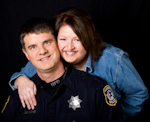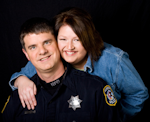Are you an angry cop?
Now, we are not asking, "Do you get angry sometimes, because of isolated circumstances that could get to anyone?" No, what we are asking is this: "Are you an angry cop? Is your job, because of what you see or experience on a day-to-day basis, or because of the pressure and politics you encounter in your agency or as a member of the law enforcement profession, turning you into someone for whom anger is a constant companion?"
Be honest, and also know that if you answered Yes outright, or suspect that you may be on the path to becoming an angry cop, that this does not indicate a character defect. You are not alone... not by a long shot.
I love being a police officer; it is just this place I hate!
This job is definitely not what I expected. If I could do it over again, I would do something else. What can I do about it now, though? It is too late to change.
It is not the idiots and jerks on the street I worry about. I can handle them. It is the idiots and jerks who run this department you need to watch out for!
I shoulda been a fireman. Everybody freakinging loves firemen.
I used to think what we did mattered. Now I know none of it mattered. It is all just a waste of time.
Do any of the above statements sound familiar? Have you heard these, or similar comments, voiced by your colleagues? Have they come out of your own mouth, or bounced around in your mind? These are just some of the many comments commonly made by angry cops. While even the most upbeat officer may occasionally think or make a comment like these, it can be a problem when the attitudes and beliefs embodied by such statements become ingrained in who you are and how you perceive your job, your world, and yourself.
We have seen firsthand the phenomenon of the angry cop. In car-to-car and coffee shop conversations at Mike's job, in the walls of Althea's office, in private e-mails from officers and comments left in response to our articles, in study and research into the LE culture, when reading and participating in online police blogs, and, if we are to be completely honest, with our own occasional in-home emotional self-examination, the angry cop is not a rare species.
The death of idealism and the birth of cynicism: The life cycle of anger
So, where do all the angry cops come from? What happens to the idealistic rookie who enters the profession with enthusiasm for every new day, only to emerge a few years down the road with a cynical, even bitter, view? When does the eager rookie turn into the tired veteran who can tell you exactly how many years, months, weeks, days, and even minutes remain until he walks out the door for the last time?
According to Dr. Kevin Gilmartin, in his book Emotional Survival for Law Enforcement, police officers undergo a change in the perspective from which they view the world, from that of civilian to that of cop. Further, they begin to spend the majority of their time with other cops, all of whom have experienced a similar change in perspective, and the officer's perspective is then reinforced and rarely challenged.Think about how many officers no longer see citizens, only suspects and victims, and those groups are often interchangeable. How often have you been lied to, or had information withheld for no apparent reason, even by those for whom the truth would have been beneficial? Eventually it is easier to just view everyone with distrust. How many times have you gone out of your way to be helpful or lenient, only to have the person you helped or gave a break to turn around and make a citizen's complaint against you? Eventually it is safer to assume everyone is against you and will disappoint you. And how many times has your day begun with news of yet another officer somewhere assaulted or killed? Eventually it is best to just assume everyone wishes you harm.
In addition to the public he or she serves, the young officer is experiencing and learning about other sources of discomfort, which can include:
- Overbearing and/or out of touch administration,
- Irrational policy and procedure expectations,
- Pressure from multiple layers of supervision,
- Liability concerns taking precedence over safety and effectiveness,
- Competing demands on his or her time and attention,
- Media that is judgmental of, and poorly educated about, law enforcement,
- Pressure to meet and respect "political" expectations, and
- Family strain resulting from the LE career.
Each of these can be a source of anger to the young officer until eventually, as Gilmartin phrases it, "anything and everything the officer disagrees with, doesn't like, or finds different is 'bulls**t.'"
How many things have you labeled "bulls**t?"
Anger defined
Anger is most commonly understood to be an emotion, or feeling, that can range from very mild irritation to all-consuming rage However, anger is far more than a mere emotional state of feeling; it is a highly evolved response to threats to our emotional or physical well-being and is necessary for our individual and societal survival. In addition to the emotional/psychological aspect of anger, there is a physiological component that is interconnected with the feeling component. When we feel angry we physically experience increased heart rate and blood pressure, and there is an increase in the production of adrenaline and noradrenalin (Harris, et.al). These physiological changes mentally and physically prepare us to defend against the threat to our well-being.
The threat from within
Anger is necessary! It informs us of danger, and prepares us to defend our well-being. It is a message something is not right. Properly used, anger is used to confront and overcome the threat, and is then set aside. Safety is achieved and order restored. Unfortunately, for many of us anger is mishandled. We fail to correct the problem or threat and put away the anger or, if the problem or threat is just something we must learn to grudgingly live with, to effectively incorporate it into our lives while still putting away the anger. We continue to live with the problem, and the related anger, until it begins to harm us.
Remember the physiological changes we undergo when angry? They are intended to be a temporary response. We are not meant to live full-time with elevated heart rate and blood pressure, and the adrenaline and noradrenalin that dumps into our system, if not dissipated, will begin to act on us much as a poison. Anger is no longer a warning; it becomes a way of life.
The threat is very real. Living with unresolved anger can lead to physical changes (high blood pressure, ulcers, etc) or turn into depression or anxiety disorders. Unresolved anger is the source of much substance abuse as people try to self-medicate their pain. Job and personal satisfaction slips, and the anger that began at work starts to infiltrate home and personal life. Soon even those who are supposed to bring you comfort, such as your spouse or children, become just someone else to distrust... they are only going to disappoint you like everyone else, anyway.
You have heard the statistics about cops and suicide, cops and alcoholism, cops and depression, cops and divorce. How many of those "statistics" is a result of uncontrolled and unresolved anger?
Does this sound like you, or someone you know?
Are you an angry cop? Maybe it is not you, but do you know any angry cops? We are going to continue this topic with Part II in next month's column, exploring effective ways to control and manage anger, and even to channel it into a positive force.

Michael Wasilewski
Althea Olson, LCSW and Mike Wasilewski, MSW have been married since 1994. Mike works full-time as a police officer for a large suburban Chicago agency while Althea is a social worker in private practice in Joliet & Naperville, IL. They have been popular contributors of Officer.com since 2007 writing on a wide range of topics to include officer wellness, relationships, mental health, morale, and ethics. Their writing led to them developing More Than A Cop, and traveling the country as trainers teaching “survival skills off the street.” They can be contacted at [email protected] and can be followed on Facebook or Twitter at More Than A Cop, or check out their website www.MoreThanACop.com.

Althea Olson
Althea Olson, LCSW and Mike Wasilewski, MSW have been married since 1994. Mike works full-time as a police officer for a large suburban Chicago agency while Althea is a social worker in private practice in Joliet & Naperville, IL. They have been popular contributors of Officer.com since 2007 writing on a wide range of topics to include officer wellness, relationships, mental health, morale, and ethics. Their writing led to them developing More Than A Cop, and traveling the country as trainers teaching “survival skills off the street.” They can be contacted at [email protected] and can be followed on Facebook or Twitter at More Than A Cop, or check out their website www.MoreThanACop.com.


